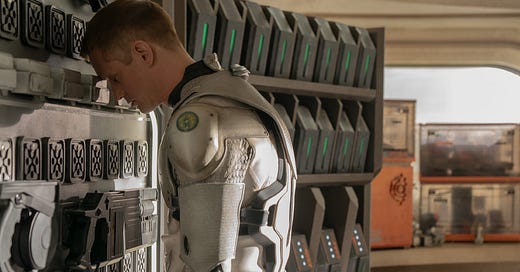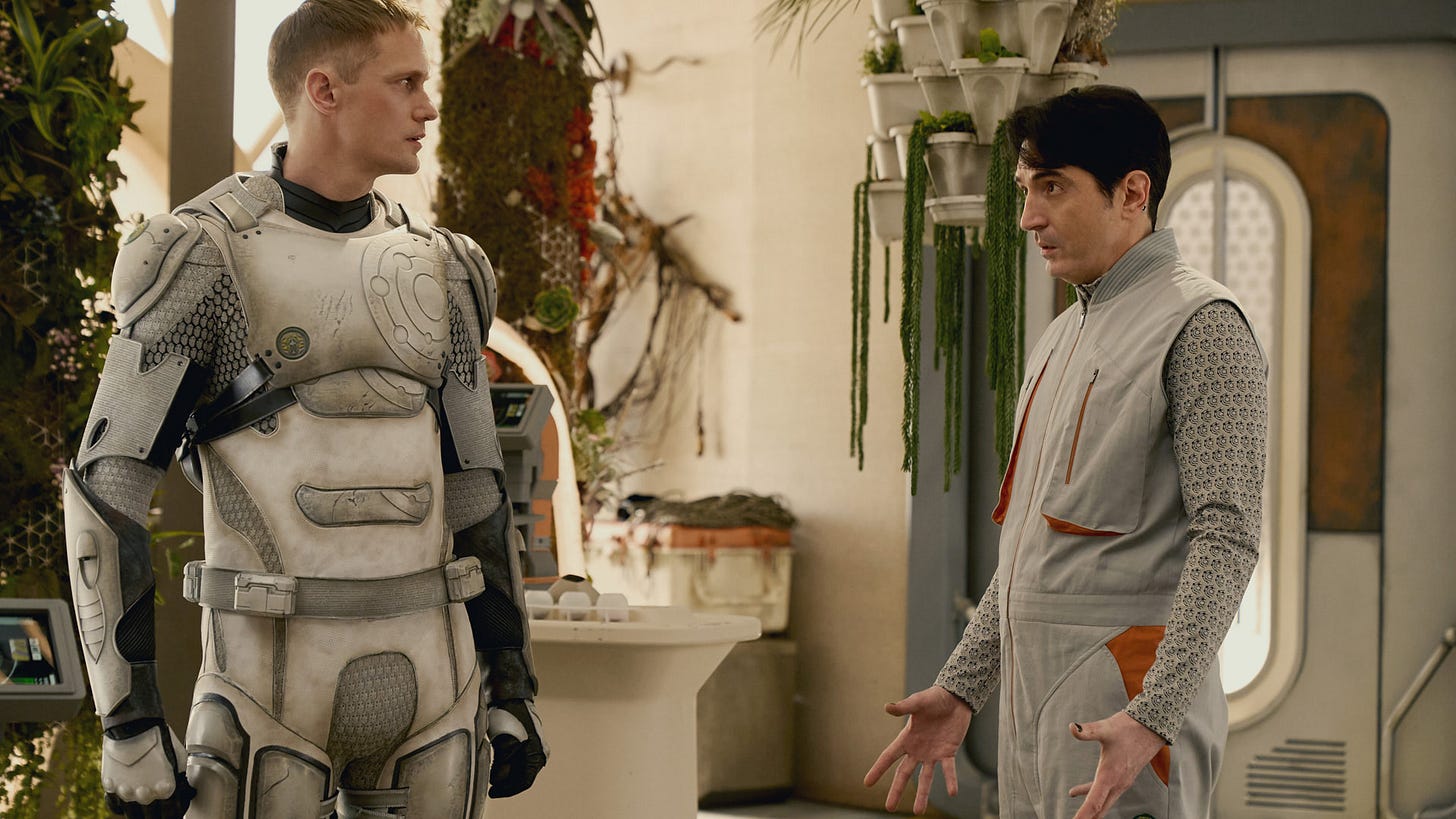Murderbot Review: Alexander Skarsgård’s TV-binging robot is a real stiff
The Apple TV+ series emphasizes exposition over humor or danger.
Episodes One & Two — “FreeCommerce,” “Eye Contact”
Can robots yearn? They can if they're Murderbot (Alexander Skarsgård), the sardonic ex-security unit from Mining Station Aratake and the lead of the new Apple TV+ sci-fi series of the same name. Created for television by Chris and Paul Weitz and based on The Murderbot Diaries by Martha Wells, the series' two-episode premiere suggests a daft yet formulaic sci-fi yarn about a robot prone to violent thoughts simply trying to live its best life. That sure sounds fun (and, honestly, kind of spooky), but know this: Murderbot's spiffy and whimsical opening credits sequence, which features stop-motion-y animation and a burst of color that vibes like a black light poster, promises a quirkier and stranger show than Murderbot actually delivers — at least so far.
"You see, I was built to obey humans. And humans? Well, they're assholes," Murderbot deadpans early on. As a refurbished Security Unit operating in the Corporate Rim, this 'bot has endured its share of disasters and assholes over the years and is thoroughly over all of it. This compounding malaise seems to have knocked something loose in its computing systems; during one feisty Corporate mining party, it hacks into its Governor module — the subroutine that keeps it docile and compliant — freeing itself to pursue interests beyond protecting sweaty space miners from alien and/or inter-company threats. Thus, Security Unit 238776431 is reborn as "Murderbot," a name that implies darker stuff lurking behind Skarsgård's folksy narration and studly Ken doll looks. But this edgy robot's freedom has one caveat: until it can slip away, Murderbot must keep up appearances for the corporate overlords who technically own it and its budding sentience, lest it be decommissioned and pulverised for parts.
This brings us to its latest assignment: protecting a group of scientists known as the "Preservation Alliance," a hippy co-op that functions outside of the Corporation Rim and is sold Murderbot despite their qualms about hiring a sentient construct — "We feel it's tantamount to enslavement," their leader, Dr. Mensah (Noma Dumezweni), tells the Corpo-cronies at Port FreeCommerce — but they need Corporate insurance to do business in the Rim. So, with noted resignation, they agree to take on SecUnit 238776431. Nobody's thrilled — not the Alliance, and certainly not Murderbot.
The premiere episode, "FreeCommerce," makes an amusing if stiff first impression. Skarsgård's chatty voiceover dumps all the need-to-know specifics on the viewer, including the various interpersonal goings-on within the free-loving Preservation Alliance, which makes the diverse ensemble register more like plot pieces than characters worthy of investment. (Which might be for the best, as performances among their ranks vary wildly in quality.) Murderbot tells us, for instance, that Mensah is well regarded for her prodigious breeding (7 kids!) and is a generous leader despite keeping her frequent panic attacks secret, while Gurathin (David Dastmalchian), a modified human who can process complex data systems like those stored inside Murderbot's head, can be a hostile jerk.
Despite the Alliance's offbeat human traits, which we must assume contrast with the Corporation's (they're kept mostly in the background, so we have to take this culture shock on the robot's word), Murderbot considers them an easy gig. Their self-sufficiency frees it up to hack Corporate satellites to binge its beloved soap opera, The Rise and Fall of Sanctuary Moon, the comically overwrought show-within-the-show. Featuring guest stars like Clark Gregg, John Cho, DeWanda Wise, and Jack McBrayer, its vivid colors, canted angles, themes of forbidden love (i.e., inter-robot/human relations), and open mockery of the JJ Abrams Star Trek aesthetic (Chu notwithstanding), Sanctuary Moon is a boost of sass and verve that outclasses Murderbot at its own dweeby comedy game.
Things inevitably get serious upon the attack of a giant worm, during which Murderbot is wounded. We discover that these peaceniks have somewhat grown on MB, so in an attempt to calm things down after the monster fracas, it reveals its true face (this robot, as it happens, is an android). This decision further softens its steely exterior; later, 'Bot decides not to slaughter the Alliance and make good its much-desired escape. Unfortunately, the scientists, compelled by Gurathin, feel otherwise about their security robot, whose face-reveal suggests a malfunctioning unit ready to snap. Maybe he's right. "Feelings, the exchange of words and fluids — I [don't] want them to pull me into it," MB mutters, a neon sign indicating that it's already in too deep.
This constant narration is both the show's lifeline and its shackle. Murderbot leans so hard into exposition that the series often tells us what to feel instead of trusting us to feel it, and it withholds information — like how Murderbot is, in fact, a handsome android, or how it hides a lost memory file that could be evidence of a prior malfunction or something more sinister — until it's casually dropped during Skarsgård's ceaseless internal monologuing. Maybe this is a byproduct of the Weitzs' adapting methods; there's a novelistic quality to MB's narration, and while being direct might serve a lore-dependent sci-fi novel, what works in prose can kill a TV show dead. Murderbot's storyline threatens to toss us down a dramatic/comedic abyss, but it never lets go of our hands.
Episode two, "Eye Contact," fares better. It stretches out two sequences to their breaking point — the Preservation Alliance goes on an illicit excursion, as Gurathin stays behind to size up Murderbot — but it's the more focused and dramatically intriguing half hour. Paranoia thickens as it becomes clear the Alliance has secrets they'd prefer the Corporation didn't know about. We also learn a wryly commentative bit of business about Murderbot, who skips sex scenes in its favorite shows — too awkward, not enough plot — which hilariously, and rightly, presents such behavior as prudish and mechanical.
Still, Murderbot is missing crucial components — the messiness, sense of danger, and Verhoeven-esque satire implied by its title. Its yearning gets lost in a stilted dramatic framework that doesn't commit to camp or carnage. Skarsgård serves as the show's anchor, while Dastmalchian is a terrific foil for him, but the narrative around them remains weirdly inert; it's plotty, chatty, and emotionally flat. Can robots yearn? Murderbot certainly tries. But this show, at least for now, plays it too safe. Maybe like its protagonist, it's still learning what it wants to be.
BEST LINE:
“What a strange expression: ‘eye contact.’ Like, our eyes are stalks coming out of our heads and touching other people’s eye stalks.” - Gurathin.
BEST MOMENT: Murderbot and Gurathin discuss the robot’s display of empathy towards the scientist it rescued from the giant tooth-worm in “FreeCommerce.” While MB insists that it was fitted with a “combat trauma module,” we discover it actually learned how to emotionally sate people from an episode of Sanctuary Moon, which is priceless.
EPISODES’ MVP: As the cagey Gurathin, Dastmalchian surpasses everyone he shares billing with, including his hulking murderbot co-star. “What’s it like to be you?” he asks, glimmers of grudging admiration, suspicion, and potential malevolence in his eyes. Dastmalchian is operating at peak weirdo powers, and Murderbot is better for it.
MECHA-MUSINGS:
Which will win “Most Worthwhile Subplot?” Is it the threesome between Ratthi (Akshay Khanna), Arada (Tattiawna Jones), and Pin-Lee (Sabrina Wu), Dr. Mensah’s panic attacks, or Gurathin’s search for Murderbot’s violent and missing memory file? My money is on the one involving Dastmalchian.
An intriguing wrinkle between the augmented human and the android: Gurathin insists on using "it" to describe Murderbot, while others are more comfortable using "he." (I went with "it," which seemed more fitting.)
I wonder if some savvy Murderbot fan will cut together all the Sanctuary Moon clips into a quasi-episode, a la that Seinfeld reunion in Curb Your Enthusiasm season seven. I’d watch it.
The show is so blah about its reality — the color blandness, the uninspired televisual shooting, the performances that have little to no tangible energy to them — that the few excursions into mayhem in these episodes (which I will withhold to avoid spoilers) feel calibrated to death.
What say you, group? Will you tune into AppleTV+ for the debut of Murderbot?
5.5 / 10
Apple TV+ drops the first two episodes of Murderbot on May 16.






